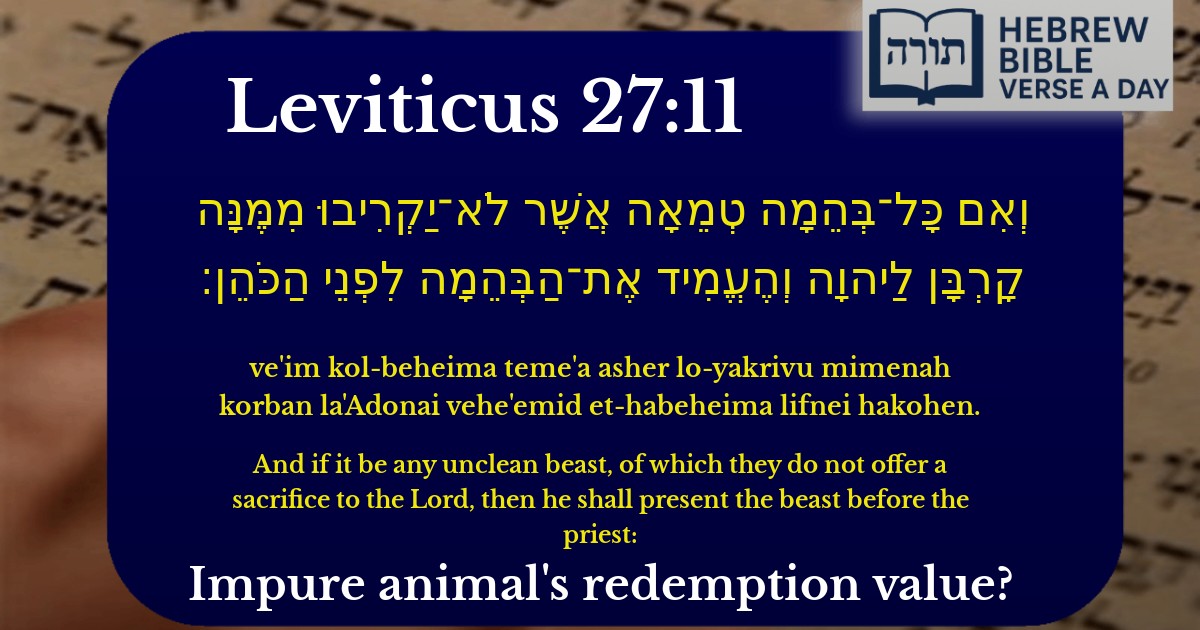Frequently Asked Questions
Q: What does Leviticus 27:11 mean?
A: Leviticus 27:11 discusses the laws regarding animals that are ritually unclean (טְמֵאָה) and therefore cannot be offered as sacrifices to Hashem. If someone vows such an animal to the Temple, they must still bring it before the Kohen (priest) for evaluation, even though it cannot be used for a korban (offering). This teaches that holiness and commitment apply even to things that cannot be used in the direct service of Hashem.
Q: Why is this verse important in Jewish law?
A: This verse is important because it establishes the principle that vows (נְדָרִים) must be taken seriously, even if the pledged item is unfit for Temple service. The Rambam (Hilchot Arachin 6:1) explains that the Kohen assesses the animal's value, and the owner must donate that amount to the Temple. This reinforces the sanctity of one's word and the importance of fulfilling commitments to Hashem.
Q: What types of animals are considered 'unclean' in this context?
A: The 'unclean' (טְמֵאָה) animals referred to here are those not kosher for sacrifice, such as non-domesticated animals (wild beasts) or those with physical defects (מום), as detailed in Leviticus 22:20-25. Rashi explains that even though they cannot be offered, the Torah still requires their valuation before the Kohen to uphold the sanctity of the vow.
Q: How does this apply to us today without the Temple?
A: While we no longer have the Temple or Kohanim to assess vows, the principle remains relevant. The Talmud (Chullin 2a) teaches that we must be careful with our words and commitments, as vows create spiritual obligations. Today, this reminds us to be truthful in our promises and to consult Torah authorities when dealing with sacred obligations or donations.
Q: What is the deeper lesson behind bringing an unfit animal before the Kohen?
A: The Midrash (Vayikra Rabbah 27:7) teaches that this law highlights Hashem's desire for our sincerity. Even if something seems 'unfit' or imperfect in our service, we must still bring it before Hashem with pure intentions. The act of presenting it to the Kohen transforms the mundane into the sacred, teaching that every aspect of life can be elevated when directed toward holiness.


Context in Vayikra (Leviticus)
The verse (Vayikra 27:11) appears in the context of the laws of arakhin (vows of valuation), where a person pledges the value of an animal, person, or property to the Beit HaMikdash. This specific verse addresses the case of an unclean (non-kosher or otherwise unfit) animal that cannot be offered as a sacrifice.
Rashi's Explanation
Rashi (Vayikra 27:11) clarifies that this refers to an animal that is tamei (ritually impure) or asur b'hana'ah (forbidden for benefit, such as a neveilah or treifah). Since such an animal cannot be brought as a korban, the owner must bring it before the kohen for valuation, and its monetary worth is given to the Temple treasury instead.
Rambam's Halachic Perspective
In Hilchot Arachin V'Charamim (6:1), the Rambam rules that if one vows the value of an impure animal, the kohen assesses its worth based on market value, and the owner must pay that amount to the Mikdash. This underscores the principle that even items unfit for sacrificial service still carry sanctity when pledged to Hashem.
Talmudic Discussion (Arachin 7a)
The Gemara analyzes why the Torah specifies presenting the animal before the kohen even when it cannot be sacrificed. The Sages derive from here that all pledged items—whether fit for the altar or not—require formal appraisal by a kohen to determine their sanctified value.
Midrashic Insight (Torat Kohanim)
The Torat Kohanim emphasizes that this law teaches kedushat bedek habayit (sanctity for Temple maintenance). Even though the animal itself has no sacrificial purpose, its pledged value becomes consecrated for the upkeep of the Beit HaMikdash, demonstrating that all contributions to divine service are significant.
Practical Implications